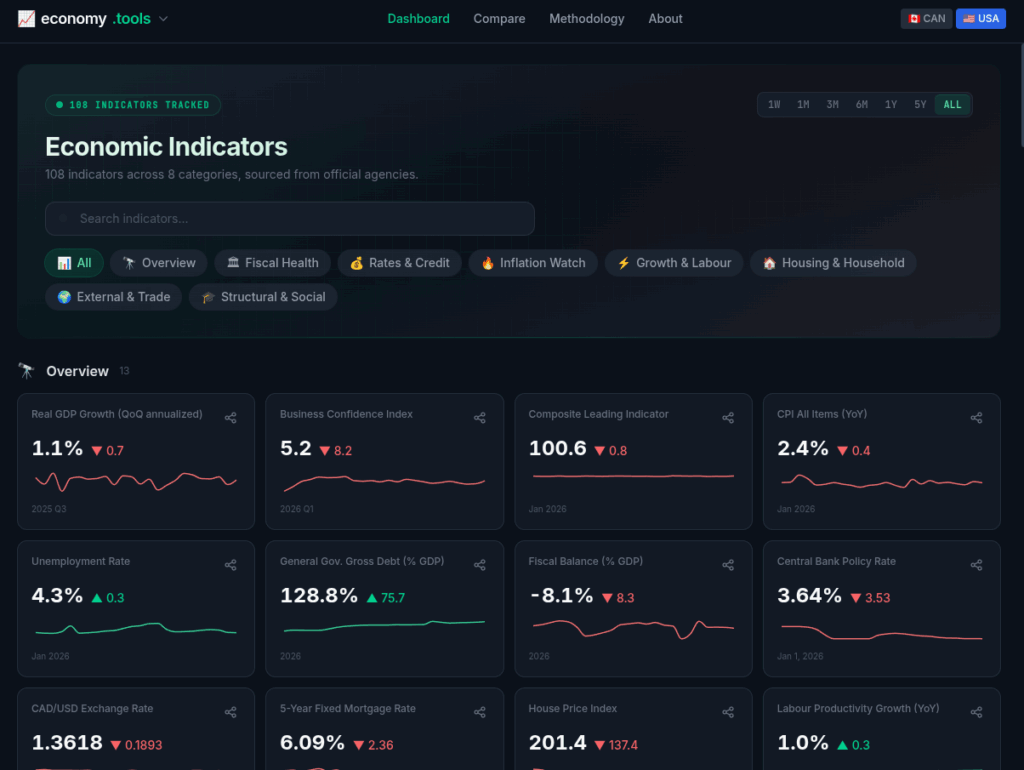I spend a lot of time looking at economic data. I’m constantly pulling numbers from Statistics Canada, the OECD, FRED, the Bank of Canada trying to get a clear picture of how the Canadian economy is actually performing.
The problem is that getting those numbers is usually very annoying.
Do you want to know Canada’s quarterly GDP growth? Go to Statistics Canada. Do you want to compare it to the United States? Call FRED.
Do you want to see where both countries rank among the OECD? That’s a different website with a different interface.
Do you want to check the household debt-to-income ratio, the output gap, and the fiscal balance in the same sitting? Soon you’ll find yourself opening a dozen tabs, cross-referencing methodologies, and hoping the date ranges line up.
All of the data is public. As a taxpayer, you funded its collection. But accessing it in any coherent way has usually required either a Bloomberg terminal or a masochistic desire.
I wanted something better. So I built it.
And I got a neat domain name for it too! It’s at economy.tools

economy.tools is a free, open dashboard that tracks 109 economic indicators for Canada and the United States. Every number comes directly from an official source. No opinions – the data speaks for itself.
This all comes from seven sources:
- OECD – the backbone, providing internationally comparable data across most indicators
- Statistics Canada – Canadian-specific series like employment surveys and building permits
- Bank of Canada – interest rates, exchange rates, and monetary policy indicators
- FRED (Federal Reserve Economic Data) – the best source for US economic series
- World Bank – structural and demographic indicators
- Bank for International Settlements – credit, debt, and financial stability data
- IMF – World Economic Outlook projections
The indicators span ten categories: GDP and growth, inflation, labour markets, fiscal policy, monetary policy and interest rates, housing, trade, productivity,
financial stability, and demographics.
Each one includes a detailed explainer: what it measures, how it’s calculated, and why it matters.
The feature I find most useful is the Canada-US comparison.
You can see at a glance where Canada leads, where it lags, and by how much. Every indicator gets a ranking against OECD peers, a z-score showing how far each country sits from the average, and a side-by-side chart going back years.
This matters because so much of Canadian economic debate happens without reference points.
The dashboard also includes OECD Economic Outlook projections, so you can see not just where things stand but where they’re headed.
I built economy.tools with AI using Claude Code, Anthropic’s AI coding tool. The entire project – data ingestion pipeline, API, frontend, 109 indicator explainers, pre-rendered static site – took about eight hours.
That’s not an exagerration. It took one working day. The architecture is a monorepo with three pieces: a shared package that defines every indicator and its data sources, a backend API that fetches and stores observations from all seven providers, and a React frontend that presents everything in a clean dashboard.
The site loads fast, works without a backend, and is fully indexable by search engines. Could I have built this without AI assistance? I might have given up due to sheer boredom. The tedious parts such wiring up seven different API adapters with different authentication schemes and data formats, writing 109 explainers with LaTeX formulas, building a responsive dashboard with charts and sparklines got done without breaking a sweat with AI. I focused on what the product should do and how the data should be presented.
The implementation moved fast.
I believe that informed citizens make better decisions. That starts with having access to the same data that policymakers and economists use.
Economic data shouldn’t be locked behind expensive terminals or scattered across dozens of government websites. It’s public information. It should be easy to find, easy to read, and easy to compare. My site is free.
If you work in public policy, journalism, research, or you just want to understand what’s happening in the Canadian economy, please enjoy! I’m just happy websites are starting to become useful again.


